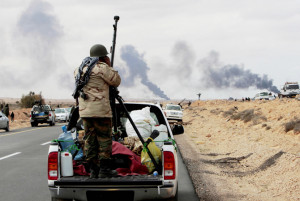
They were blown up because of an operation launched in mid-May by Libyan General Khalifa Hefter to “cleanse Benghazi and the country from entrenched terrorists and extremists.” The strike was carried out against a number of brigades of former rebels, in particular Ansar al-Sharia. It was declared a terrorist and charged with having participated in the assault on the US Consulate in Benghazi in 2012.
The general has declared himself commander of the Libyan National Army; he is supported by various forces including tribesmen and local air power. A professional soldier, he was previously an associate of Gaddafi since the latter’s rise to power in 1969. According to some reports, Hefter studied in the USSR. In the late ‘80s, he broke with the leader and took refuge in the US, where he lived for two decades. As soon as the uprising against his former boss began in 2011, Hefter aligned himself with the rebels.
The official Libyan authorities (the leadership of the interim parliament and government) have accused the retired general, who is over 70, of plotting and attempting a coup. Attitudes in political circles and throughout the country’s regions cover a range of contradictory positions: from support to condemnation to neutral and tentative.
On the Arab Street, there is sympathy for the populist retiree, who promises to punish “sponsors of terrorism” and establish safety and order. In numerous cities, demonstrations have been held in support of him. However, does this not reflect the growing longing for the establishment of rule by a “strong hand” in this country suffering from the tyranny of its militants and the impotence of its authorities?
The present situation in Libya is complicated and pulsates with misleading messages. The heterogeneous conglomerate of factions now in power has no single power bloc and is fragmented.
Behind the facade of an elected parliament are loose alliances of forces, based on the formation of militias along regional and tribal lines, each with opportunistic interests. All, however, swear that they are defending the ideals of the “February 17 Revolution” that toppled Gaddafi.
The impulsive nature of these actions and the obvious rift between the government and parliament are clearly evident. Thus, a number of members of the government, fearing new human victims, demand all foreign and illegal armed militias withdraw from Tripoli and its environs.
The Speaker of Parliament, on the contrary, called on a brigade from the city of Misrata for help. It is thought to have Islamist leanings, to the advantage of the local version of the Muslim Brotherhood.
The general’s actions may give a signal leading to the formation of a coalition against the Islamists. But they are also capable of consolidating his opponents and pushing them toward a battle with their political rivals in the country, geographically the largest in North Africa.
Libya’s drift is disquieting to neighboring countries. Algeria has closed its border crossings with Libya, some foreign embassies in Tripoli have suspended their operations, and the Arab League representative appointed to mediate dialogue among Libyan factions has postponed his trip to Tripoli at the request of his hosts.
The US deployed additional Marine forces and aircraft from Spain to an air base in Sicily. As the situation in this oil-producing country heats up, oil prices have crept upward since the beginning of the week.
Representatives of the US and its Western allies made a joint statement expressing deep concern over the ongoing violence in Libya. But such a reaction, which has become commonplace , cannot dim our memory of the fact that three years these NATO members contributed with their attacks to the destruction of the power structure, albeit an authoritarian one, in Libya.
As a result, a country deprived of its core and of important tools of statehood , has been plunged, like Afghanistan and Iraq, into a systemic crisis, from which it can do nothing to extricate itself. Each such crisis in post-revolutionary Libya brings a harvest of new victims to the nation.
Yuriy Zinin, senior researcher at the Moscow State Institute of International Relations (MGIMO); exclusively for the online magazine “New Eastern Outlook”.
